Filter by
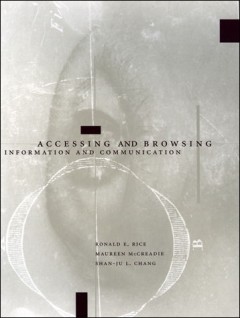
Accessing and browsing information and communication
This book contends that accessing and browsing information and communication are multidimensional and consequential aspects of the information user's entire experience and of general human behavior. Problems in information creation, processing, transmittal, and use often arise from an incomplete conceptualization of the "information seeking" process, where information seeking is viewed as the i…
- Edition
- -
- ISBN/ISSN
- 9780262256865
- Collation
- 1 online resource (xiii, 357 pages) :illustrations
- Series Title
- -
- Call Number
- -
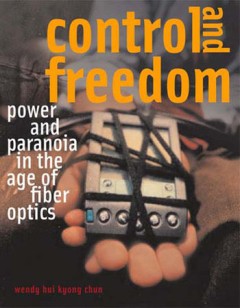
Control and Freedom: Power and Paranoia in the Age of Fiber Optics
"How has the Internet, a medium that thrives on control, been accepted as a medium of freedom? Why is freedom increasingly indistinguishable from paranoid control? In Control and Freedom, Wendy Hui Kyong Chun explores the current political and technological coupling of freedom with control by tracing the emergence of the Internet as a mass medium. The parallel (and paranoid) myths of the Intern…
- Edition
- -
- ISBN/ISSN
- 9780262288583
- Collation
- -
- Series Title
- -
- Call Number
- -
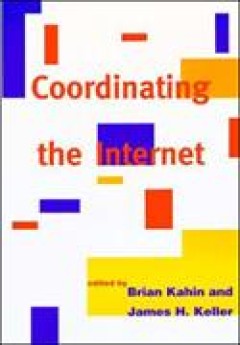
Coordinating the Internet
For years, the world saw the Internet as a creature of theU. S. Department of Defense. Now some claim that the Internet is aself-governing organism controlled by no one and needing nooversight. Although the National Science Foundation and othergovernment agencies continue to support and oversee criticaladministrative and coordinating functions, the Internet is remarkablydecentralized and uninst…
- Edition
- -
- ISBN/ISSN
- 9780262286909
- Collation
- -
- Series Title
- -
- Call Number
- -

Cost Proxy Models and Telecommunications Policy: A New Empirical Approach to …
An empirical approach to understanding telecommunications regulation based on the use of a sophisticated engineering cost proxy model.The telecommunications industry defies easy characterization. The long-distance sector is highly competitive and the local exchange sector much less so, while digital transmission and switching have blurred the distinction between traditional voice communication …
- Edition
- -
- ISBN/ISSN
- 9780262273589
- Collation
- -
- Series Title
- -
- Call Number
- -
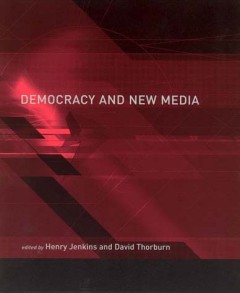
Democracy and new media
Digital technology is changing our politics. The World Wide Web is already a powerful influence on the public's access to government documents, the tactics and content of political campaigns, the behavior of voters, the efforts of activists to circulate their messages, and the ways in which topics enter the public discourse. The essays collected here capture the richness of current discourse ab…
- Edition
- -
- ISBN/ISSN
- 9780262276290
- Collation
- 1 online resource (x, 385 pages).
- Series Title
- -
- Call Number
- -
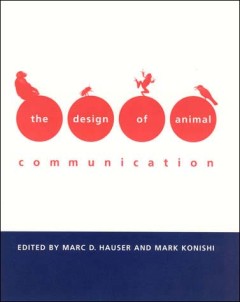
The Design of animal communication
"A Bradford book."Based on a symposium which took place on March 22 and 23, 1997 at the University of California Davis.When animals, including humans, communicate, they convey information and express their perceptions of the world. Because different organisms are able to produce and perceive different signals, the animal world contains a diversity of communication systems. Based on the approach…
- Edition
- -
- ISBN/ISSN
- 9780262275088
- Collation
- 1 online resource (xi, 701 pages) :illustrations.
- Series Title
- -
- Call Number
- -
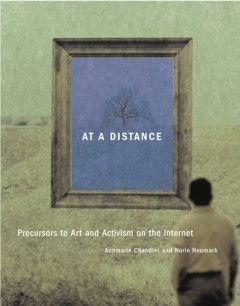
At a distance :precursors to art and activism on the Internet
Networked collaborations of artists did not begin on the Internet. In this multidisciplinary look at the practice of art that takes place across a distance -- geographical, temporal, or emotional -- theorists and practitioners examine the ways that art, activism, and media fundamentally reconfigured each other in experimental networked projects of the 1970s and 1980s. By providing a context for…
- Edition
- -
- ISBN/ISSN
- 9780262270144
- Collation
- 1 online resource (xiv, 486 pages) :illustrations.
- Series Title
- -
- Call Number
- -

Technologies of choice? :ICTs, development, and the capabilities approach
Information and communication technologies (ICTs)--especially the Internet and the mobile phone--have changed the lives of people all over the world. These changes affect not just the affluent populations of income-rich countries but also disadvantaged people in both global North and South, who may use free Internet access in telecenters and public libraries, chat in cybercafes with distant fam…
- Edition
- -
- ISBN/ISSN
- 9780262305518
- Collation
- 1 online resource.
- Series Title
- -
- Call Number
- -
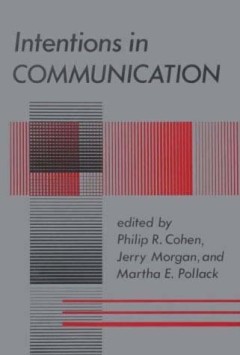
Intentions in communication
"A Bradford book."Intentions in Communication brings together major theorists from artificial intelligence and computer science, linguistics, philosophy, and psychology whose work develops the foundations for an account of the role of intentions in a comprehensive theory of communication. It demonstrates, for the first time, the emerging cooperation among disciplines concerned with the fundamen…
- Edition
- -
- ISBN/ISSN
- 0585363692
- Collation
- 1 online resource (x, 508 pages) : illustrations.
- Series Title
- -
- Call Number
- 005 INT
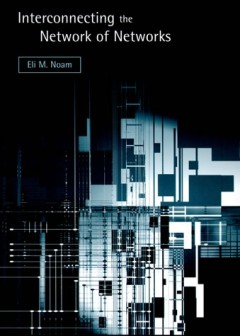
Interconnecting the network of networks
This book describes the transformation of telecommunications from national network monopolies to a new system, the "network of networks," and the glue that holds it together, interconnection. By their very nature, monopoly-owned networks provided a small number of standardized, nationwide services. Over the past two decades, however, new forces in the world economy began to unravel this traditi…
- Edition
- -
- ISBN/ISSN
- 9780262280693
- Collation
- 1 online resource (ix, 318 pages) :i llustrations
- Series Title
- -
- Call Number
- 005 NOA i
 Computer Science, Information & General Works
Computer Science, Information & General Works  Philosophy & Psychology
Philosophy & Psychology  Religion
Religion  Social Sciences
Social Sciences  Language
Language  Pure Science
Pure Science  Applied Sciences
Applied Sciences  Art & Recreation
Art & Recreation  Literature
Literature  History & Geography
History & Geography